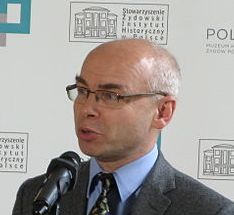Dariusz Stola | |
|---|---|
 Stola in 2014 | |
| Born | Dariusz Jan Stola December 11, 1963 Warsaw, Poland |
Dariusz Stola is a professor of history at the Institute of Political Studies of the Polish Academy of Sciences. [1]
Dariusz Stola | |
|---|---|
 Stola in 2014 | |
| Born | Dariusz Jan Stola December 11, 1963 Warsaw, Poland |
Dariusz Stola is a professor of history at the Institute of Political Studies of the Polish Academy of Sciences. [1]
Stola teaches modern history and studies 20th-century human migrations, the Holocaust, Polish-Jewish relations, and the history of postwar Poland's communist regime. From 2014 to 2019 he was director of the POLIN Museum of the History of Polish Jews. He is the author or co-author of seven books and over one hundred scholarly papers. [1]
Stola is a two-time recipient of the Polityka magazine award, and a recipient of the award of the Edward Raczyński Polish Foundation in London, England. [1] [2] [3] [4]